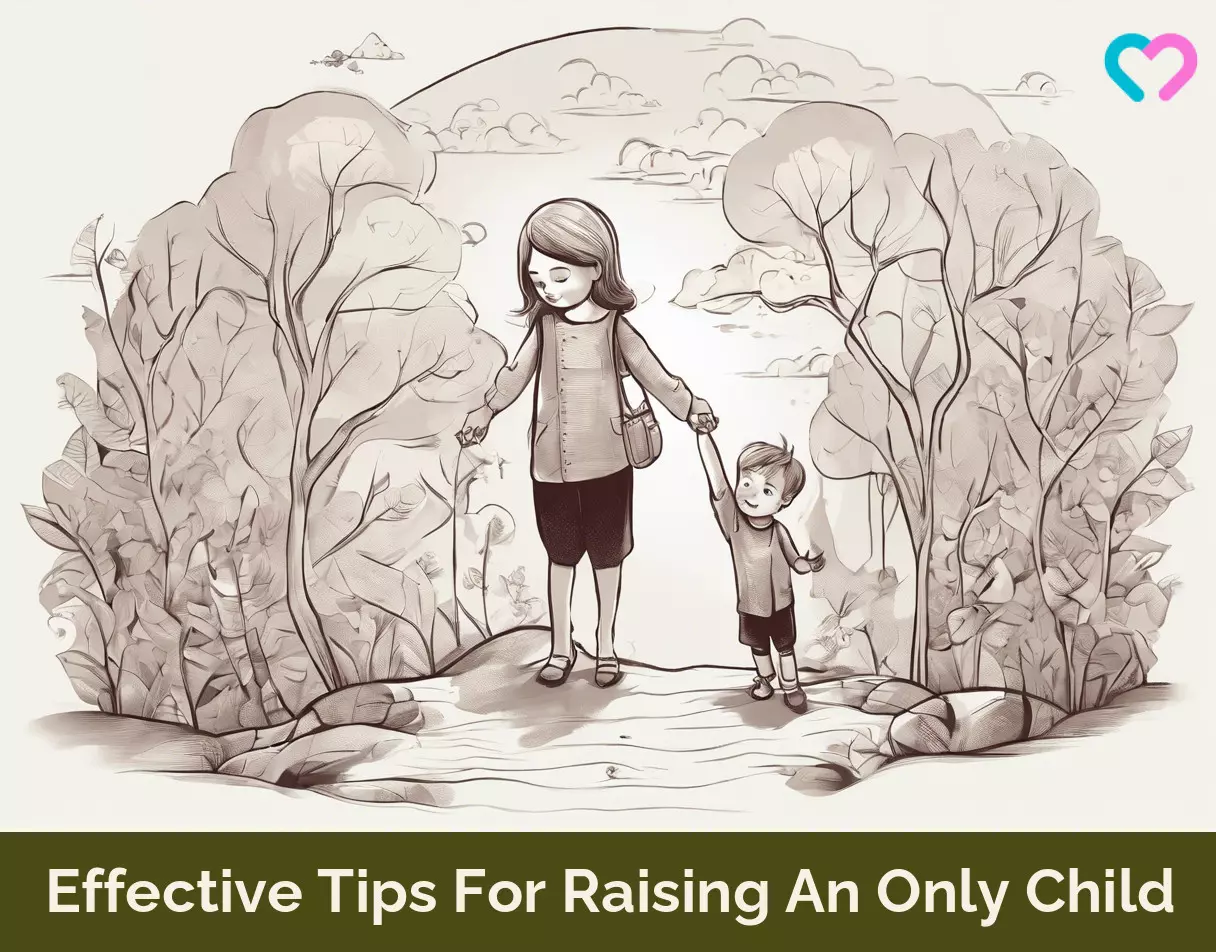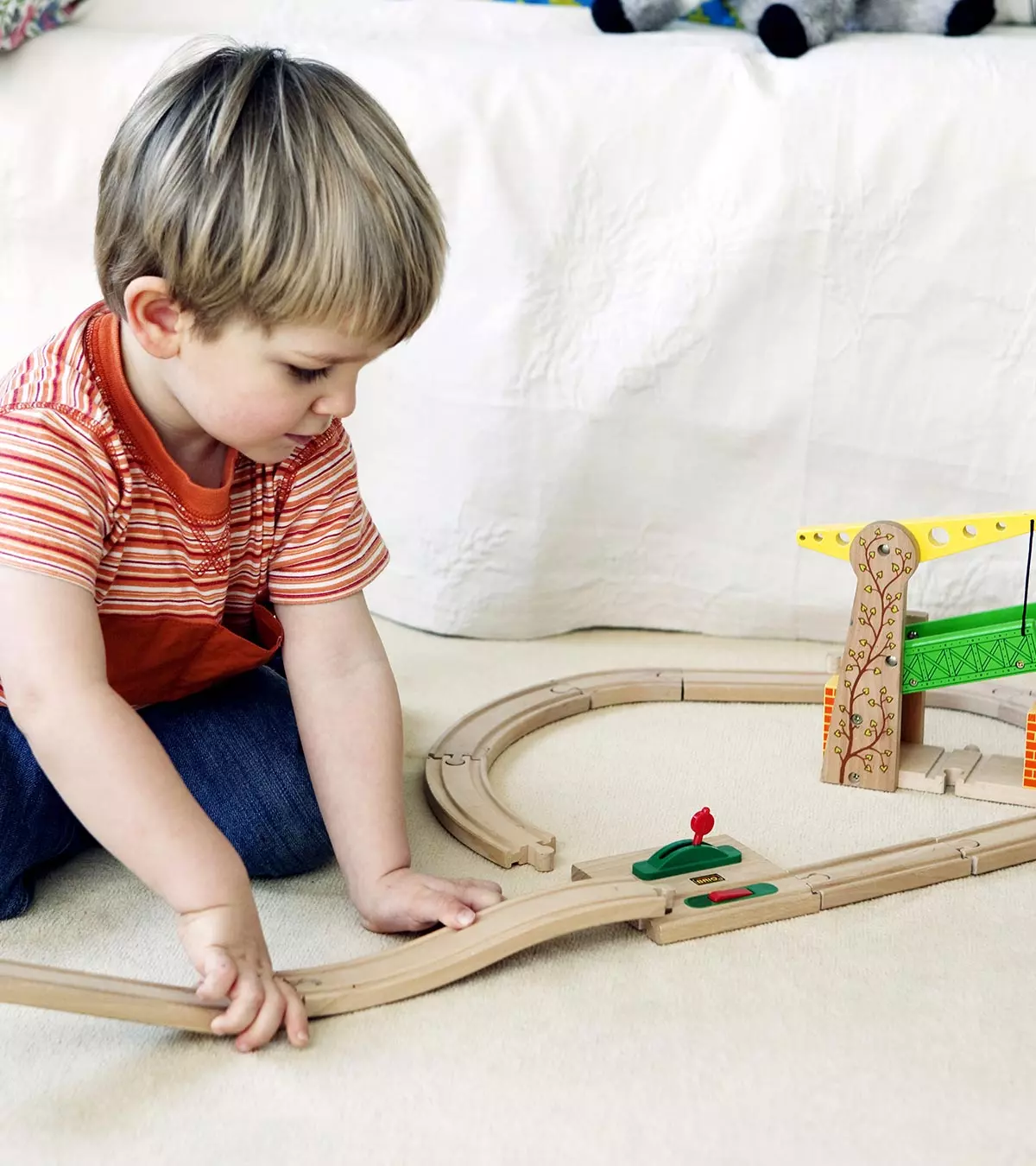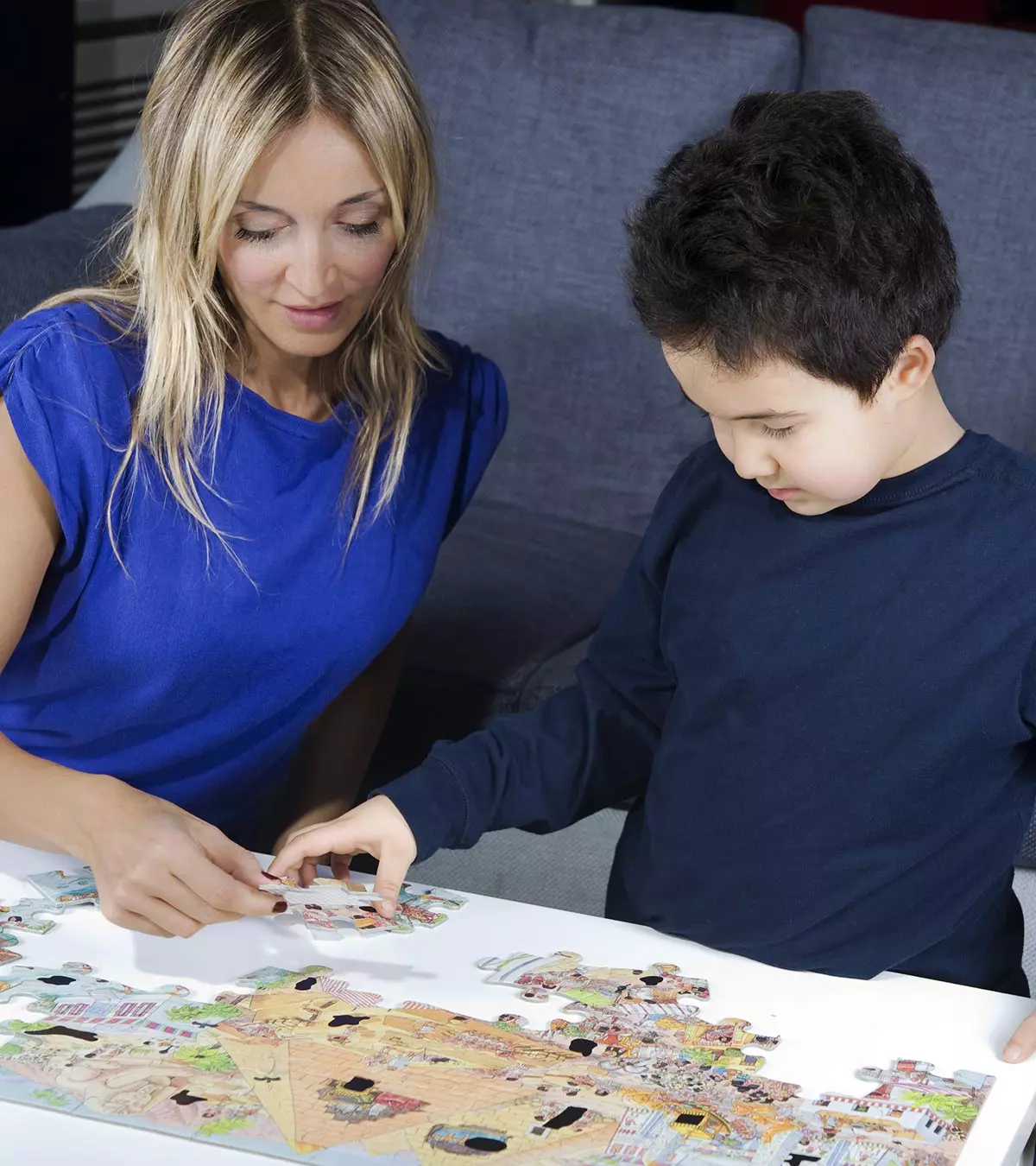
Image: iStock
Raising an only child is sometimes a conscious decision several parents take. However, studies also suggest a rise in single-child families due to monetary problems, a rise in divorce rates, and personal reasons (1) (2).

Many parents have concerns about their single child growing up lonely or spoiled. Also, many negative stereotypes or misconceptions surround single children in society (for example, single children are thought to seek extra attention, act strangely, and be self-centered), which may increase their worries.
Although having siblings has its advantages, raising a single child to be a mature, responsible, and meticulous individual is quite rewarding. Read this article to explore some tips that could help you raise your only child to be a wholesome adult.
Key Pointers
- Single children are more mature, educated, and creative.
- While raising an only child, restrict over-indulgence into their lives and help them find their identity.
- Encourage them to attend social activities since only children may struggle with social interaction and lack core relationship skills.
Benefits Of Being An Only Child

Before we explore the tips, let’s learn about the many advantages of being an only child (2) (3).
1. Maturity: Only children show high maturity levels. Research suggests that this has to do with only children spending considerable time with their parents and adults and behaving like adults (3).
2. Intelligence: Only children show high intelligence and motivation scores. The undivided attention that they receive from their parents helps them to become more discerning and articulate (2) (3).
3. Education: Parents of only children are generally well educated, and thus, give high importance to education. They invest their time interacting with children and teaching them new things. Furthermore, this helps only children perform well in school with a lesser financial burden. A solo-child family can provide the best education they can afford and introduce the child to a series of interesting and exciting extracurricular activities. These factors contribute to single children being well educated (3).
4. Creativity: With no siblings around, single children spend considerable time alone. They entertain themselves by inventing new games and imaginary worlds, friends, and siblings. As a result, they tend to be creatively inclined (2).
Rachel Donovan, a mother who herself grew up as a single child, reflects how she had imaginary friends during her childhood. She says, “I had imaginary friends growing up. I was totally in a world of make-believe most of the time in my play when I was by myself and I think that was great. I think it helped develop my imagination and just my ability to be alone (i).”
5. Self-esteem: Parents of only children direct all their attention, love, and appreciation toward their child. This helps single children become self-assured and confident. In addition, constant positive reinforcement helps them build a positive self-image. Research shows that only children have high self-esteem, a strong sense of independence, and faith in their abilities (3).
 Point to consider
Point to considerHow To Raise An Only Child?
If you are a parent of an only child, you might want to know how you could raise your child to be a well-rounded and friendly person. Read the following tips on how to proceed with a single child-rearing.
1. Encourage social interactions

Only children spend much of their time playing by themselves or with imaginary friends. This can cause them to struggle in their social interactions. Hence, it is vital to encourage them to engage in social activities with their peers and spend time with someone their age (3).
Ensure you arrange for regular playdates with children their age. This way, your child will learn to share their toys, home, your attention, etc., and understand how to adapt and adjust. Such nurturing interactions will also help them learn the concept of patience and develop their social skills.
2. Demonstrate important relationship values
Children with siblings learn important relationship values by interacting with their siblings. Only children, on the other hand, may miss out on such valuable experiences. Demonstrating relationship values such as compromising, sharing, accepting wins and losses with grace, and showing thoughtfulness can help them handle the intricacies of relationships in the future.
3. Avoid excess hand-holding
Only children can rely excessively on their parents at times. While it is natural for children to rely on their parents, overdependence can be unhealthy. So, take a step back and let your child cope with certain issues independently. This autonomy will help them effectively handle conflicts with minimal parental interference and teach them responsibility and self-sufficiency.
4. Encourage them to show empathy and kindness

Sibling relationships lead to the development of critical values such as empathy and kindness. Parents of only children can ensure they inculcate such values in their children by giving them opportunities to experience these virtues. Demonstrate these values in your day-to-day life and show your child some real-life instances of empathetic and kind behavior. Involve them in volunteer work or raise a pet with them. This will ensure that they find solace from feelings of loneliness and boredom and spend their time more productively.
5. Avoid reinforcing perfectionism
Only children tend to be perfectionists (4). They might even expect others to follow the same standards. Avoid reinforcing this perfectionism. Try to avoid improving or reworking on every task they do and let them make mistakes and learn from them.
6. Let them establish their own identity
Parents have a considerable influence on an only child. As a result, the child may sometimes feel like they do not have their own identity and merely reflect their parent’s expectations and failures (2). Do not expect your child to fulfill the dreams you could not achieve. Instead, encourage them to explore their true interests and make their own decisions (3).
7. Do not overburden them
Do not set unrealistic and unattainable expectations for them. This may put undue pressure on them, causing them to stress out. While many only children may be high flyers, parents should have realistic expectations. Only children often show maturity and behave like adults, but it is crucial to remember that they are still children. Let them enjoy their childhood.
 Do remember
Do remember8. Support them in their lows
Only children can get highly self-critical and hold themselves responsible for everything that goes wrong in their lives, such as a bad day at school or poor grades. While it is natural for you to feel displeasure, try not to pull them down. Instead, listen to the child in such a scenario and discourage any negative thoughts. Only children seek their parent’s approval, so offer them your unconditional support and encouragement.
9. Avoid overindulging your only child
Only children generally get everything they need and more from their parents. On the contrary, children with siblings may not have this luxury. They have to share their things and often wait for their needs to be met. Therefore, do not overindulge your only child (3). They need to know that you will not fulfill their unreasonable demands and every whim.
This can be achieved by following specific techniques. First, a limit can be set for the maximum number of gifts or things they could receive in a year. Next, teach them to earn the stuff they want by doing little chores around the house. The delayed gratification and efforts required will help them understand the value of things and teach them practical skills and responsibility.
10. Avoid being the constant playmate for your only child
Only children often look for companionship and playmates at home. While you should interact and play with them, it will not be feasible and prudent to do this constantly — you have your chores and duties to attend to.
Plan your schedule to ensure that you devote some time to entertain your child, and let them know how long you can play with them. Then, for the remaining time, encourage the child to play on their own or help them make friends. This balanced approach will reduce parental dependence.
11. Establish clear boundaries
Single children remain close to their parents and may display adult behavior. For example, they might act bossy and expect to weigh in on every decision. If not stopped at the right time, they may start back-talking and expressing their opinions on issues concerning adults. It is critical to establish clear boundaries to avoid such scenarios.
The child should be taught what behavior is acceptable and what is not. While it is good to seek their input on some decisions, involve the child only in decisions about them or the household.
12. Encourage them to smile in difficult situations
Only children tend to be intelligent and high achievers striving to do their best. If they fail, they can become stressed and depressed. Teach your child not to get bogged down by difficult situations. Encourage them to face and accept such situations with a smile. A humorous approach helps to diffuse a stressful situation. A friendly and happy home environment can also help them laugh more and view things positively.
13. Treat your child like a child
The mini-adult-like behavior that they exhibit may make it easy for only children to be considered as adults. Avoid making this mistake. They should not be forced to grow up too soon. This does not mean you should treat them like babies — coddling them might impact their emotional growth. Instead, treat them in a manner that is age-appropriate (3).
14. Ignite passions
Identify and ignite your children’s passions. Encourage them to pursue hobbies and interests. Socializing with peers through these activities helps them make friends but also allows them to discover their passions. This exploration can foster individuality and a sense of self, benefiting all children, especially those without siblings.
15. Encourage individualism
As children grow, they may seek validation and conformity, potentially leading to negative peer pressure. To counter this, foster individualism from an early age. Teach your only child to value uniqueness over conformity, promoting a sense of self that resists the influence of the crowd.
The ultimate goal of raising a single child is to nurture their individuality while helping them develop essential life skills. Finding a balance between guidance and independence will empower them to succeed in various areas of life.
 Be watchful
Be watchfulDisadvantages Of Being An Only Child
Being an only child can often mean being the center of their parent’s world. This comes with its own set of issues. Only child syndrome is quite common in single children. Here are a few disadvantages of being an only child.
1. Excessive parental focus: Only children depend entirely on their parents for support. They have limited experience interacting with children their age since most of the only child’s interactions involve adults. In the absence of siblings, they have no one to share their feelings except the adults. Thus, many only children tend to bottle up their emotions and deal with situations alone (2).

2. Parental pressure and influence: Parental influence is significant in only children. Many single children cannot break free from their overprotective parent’s influence throughout their lifetime. They feel intense parental pressure and may have issues establishing their own independent identity (2).
3. Lack of essential relationship skills: Siblings often have to share their parent’s attention. When the younger sibling is born, the older child has to handle the loss of attention, while the younger child has to deal with the stronger older sibling. Single children do not have to share their parents’ attention or deal with a sibling conflict. Thus, they may have dependency issues, become self-centered, and fail to recognize other people’s wants or empathize with others (2).
4. Problems with social interaction: Single children might find it challenging to handle conflicts while working in groups. Children with siblings learn to compromise, compete, and resolve conflicts early on in life, thus gaining many social experiences while interacting with their siblings. Only children have to learn interpersonal skills without the guidance and support of their siblings, and hence, they may make many mistakes (2).
5. Internalization of issues: Only children may hold themselves solely responsible for everything happening in their lives. They might internalize their problems and find it difficult to handle challenges. Taking the entire blame for all their failures can cause many only children to become depressed (2).

Frequently Asked Questions
1. What are the personality traits of an only child?
The only child of the parents could be confident, have higher self-esteem, a higher sense of privacy, does well academically, is capable of enjoying their alone time, is independent, and be more organized. However, these traits may not be seen in all single children. It also depends on the child’s personality and upbringing.
2. Do only children get more depressed?
Research has shown increased anxiety and depressive symptoms in college-going only children. However, it also depends on one’s life experiences, support system, and family environment (5).
3. Are single children lonely?
Single children can experience feelings of loneliness, but not all do. Loneliness is a normal and common experience due to various factors, such as a lack of socialization or changes in life circumstances. However, single children may also have strong social networks, engage in activities, and develop meaningful relationships, just like children from other family structures.
4. Are siblings happier than only children?
It is inaccurate to generalize that one type of family structure leads to more happiness. Happiness is subjective and influenced by various factors such as personality, family environment, relationships, and life circumstances. Both siblings and only children can have fulfilling and happy lives.
Since siblings play an important role in shaping a child’s character and childhood, parents with a single child may often think of the benefits and negative effects of raising an only child. You can raise an independent and socially confident child by ensuring they have a strong social circle, demonstrating relationship values, and avoiding overpampering them. In addition, refrain from overburdening them with your expectations and encourage their individuality. Having a group of good friends and friendly, understanding parents can help prevent an only child from feeling lonely.
Infographic: Some More Advantages and Disadvantages Of Being A Single Child
Families with a single child are on the rise, yet several myths declare being a single child disadvantageous. However, there are two sides to something, and so is the case of being an only child. The infographic below lists some more pros and cons of being a single child.
Some thing wrong with infographic shortcode. please verify shortcode syntax
Illustration: Effective Tips For Raising An Only Child

Image: Stable Diffusion/MomJunction Design Team
Personal Experience: Source
MomJunction articles include first-hand experiences to provide you with better insights through real-life narratives. Here are the sources of personal accounts referenced in this article.
i. My only child experience | Rachel Weiland; YoutubeReferences
- Katherine Trent K and Glenna D Spitze; Growing up without siblings and adult sociability behaviors; J Fam Issues (2011).
- The Rise of Single-Child Families: Psychologically Harming the Child?; Intuition: The BYU Undergraduate Journal of Psychology
- Maida Rivera and Jeanette Carrasquillo; Spoiled or Spectacular, A look at the only child; Education Resources Information Center; Institute of Education Sciences
- Jennifer M. Brown M.S. and John E. Grable; Sibling Position and Risk Attitudes: Is Being an Only Child Associated with a Person’s Risk Tolerance?; Financial Therapy Association; Journal of Financial Therapy (2015).
- Shuo Cheng, et al.; Only Children Were Associated with Anxiety and Depressive Symptoms among College Students in China; National Library of Medicine
Community Experiences
Join the conversation and become a part of our nurturing community! Share your stories, experiences, and insights to connect with fellow parents.
Read full bio of Sadhvi Nishtha Om
Read full bio of Apoorva K
Read full bio of Harshita Makvana
Read full bio of Vidya Tadapatri
















